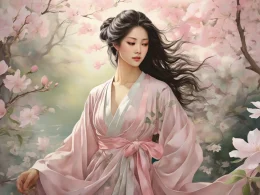The crescent moon rises and hangs on city wall;
The rising moon on city wall shines over all.
There're a thousand homes in seven districts on frontier;
Half of the Tartars play pipa for us to hear.
The heart would be broken to hear the pipa song,
When the wind sheds leaves in showers and night is long.
West of the River I have so many compeers;
Many friends are separated from me for many years.
Before the flowery gate we see autumn grass.
Could we bear to see friends grow old like it? Alas!
How many times can we laugh in a life so fleet?
So let us drink our fill till drunken, now we meet!
Original Poem:
「送李副使赴碛西官军」
岑参
火山六月应更热,赤亭道口行人绝。
知君惯度祁连城,岂能愁见轮台月。
脱鞍暂入酒家垆,送君万里西击胡。
功名祗向马上取,真是英雄一丈夫。
Interpretation:
TThis poem by Cen Shen was composed in 754 during his journey to Beiting. While passing through Liangzhou, he gathered with old friends serving at the Hexi Military Headquarters. Liangzhou, a vital city on the Tang dynasty's northwestern frontier, was both a military stronghold and a hub of cultural exchange. The poem depicts the borderland scenery, local customs, and the lively banquet, reflecting the prosperity of the Tang dynasty and the poet's optimistic spirit.
First Couplet:“弯弯月出挂城头,城头月出照凉州。”
(The crescent moon rises and hangs over the city walls, illuminating Liangzhou below.)
The opening couplet portrays the night scene of Liangzhou. The crescent moon initially appears over the city walls, gradually ascending and casting its silvery glow over the entire city. By repeating "月出" (the moon rises), the poet captures both the moon's movement and the serene, luminous atmosphere, setting the stage for the city's vibrant life.
Second Couplet:“凉州七里十万家,胡人半解弹琵琶。”
(Liangzhou spans seven miles with ten thousand households, where many Hu people are skilled in playing the pipa.)
This couplet highlights the prosperity and cultural richness of Liangzhou. The depiction of "seven miles with ten thousand households" emphasizes its vastness and prominence, while the Hu people's mastery of the pipa reflects the harmonious coexistence of diverse cultures. The use of music symbolizes the city's lively and integrated social fabric.
Third Couplet:“琵琶一曲肠堪断,风萧萧兮夜漫漫。”
(A single pipa melody stirs the soul, as the soughing winds accompany the endless night.)
The focus shifts to the banquet scene, where the haunting pipa melody captivates listeners, blending with the melancholy sound of the night wind. The contrast between the stirring music and the vast, silent night deepens the emotional resonance, setting a poignant tone for the poet’s reflections.
Fourth Couplet:“河西幕中多故人,故人别来三五春。”
(In the Hexi headquarters, many old friends remain, though it’s been three or five springs since we parted.)
Here, the poet transitions to personal emotions, expressing the joy of reuniting with old friends after years apart. The phrase "three or five springs" conveys both the passage of time and a sense of nostalgia, emphasizing the value of cherished relationships.
Fifth Couplet:“花门楼前见秋草,岂能贫贱相看老。”
(In front of Huamen Tower, the autumn grass withers; how can we idly grow old in poverty?)
Using autumn grass as a metaphor for fleeting time, the poet conveys his determination to rise above mediocrity. The imagery inspires a sense of urgency and ambition, encouraging action and achievement in life.
Sixth Couplet:“一生大笑能几回,斗酒相逢须醉倒。”
(How many hearty laughs can one have in a lifetime? Let us drink and revel until we fall!)
The concluding couplet celebrates the joy of friendship and the ephemeral nature of life. It reflects the poet’s belief in seizing the moment and enjoying life to the fullest, embodying the grandeur and optimism of the Tang dynasty.
Writing Features:
- Progressive Structure: The poem moves from the serene night scene to the lively banquet, culminating in expressions of friendship and life philosophy.
- Contrasting Imagery: The juxtaposition of the city’s prosperity with the plaintive pipa tune enriches the poem's emotional depth.
- Magnanimous Tone: The flowing language and exuberant emotions showcase the poet’s heroic and optimistic character.
Overall Appreciation:
Set against the backdrop of Liangzhou, this poem weaves together moonlight, pipa melodies, and a festive banquet to depict a thriving city and heartfelt friendships. Cen Shen’s vivid imagery and sincere emotions highlight the grandeur of Tang-era frontier life. The poem’s blend of borderland ambiance and human warmth, combined with its celebration of camaraderie, makes it an enduring masterpiece that exudes the spirit of the Tang dynasty.
Insights:
Life is fleeting, and the moments of reunion and joy deserve to be treasured. This poem reminds us to embrace life with vigor and optimism, pursuing our dreams while cherishing bonds of friendship. The poet’s spirited outlook reflects the timeless essence of the Tang dynasty’s bold and ambitious ethos.
Poem translator:
Xu Yuan-chong (许渊冲)
About the poet:

Cen Can(岑参), 715 - 770 AD, was a native of Jingzhou, Hubei Province. He studied at Mt. Songshan when he was young, and later traveled to Beijing, Luoyang and Shuohe. Cen Shen was famous for his border poems, in which he wrote about the border scenery and the life of generals in a majestic and unrestrained manner, and together with Gao Shi, he was an outstanding representative of the border poetry school of the Sheng Tang Dynasty.












